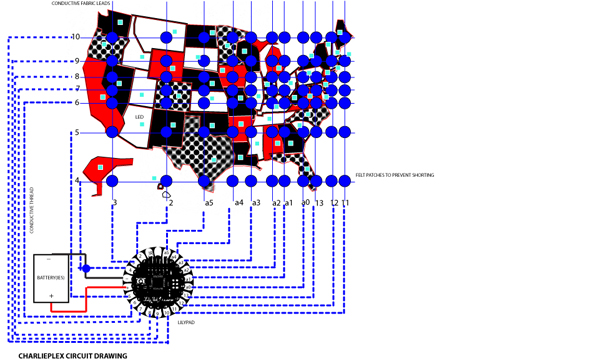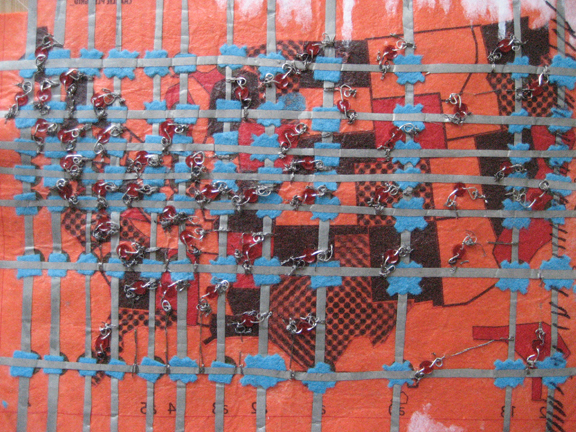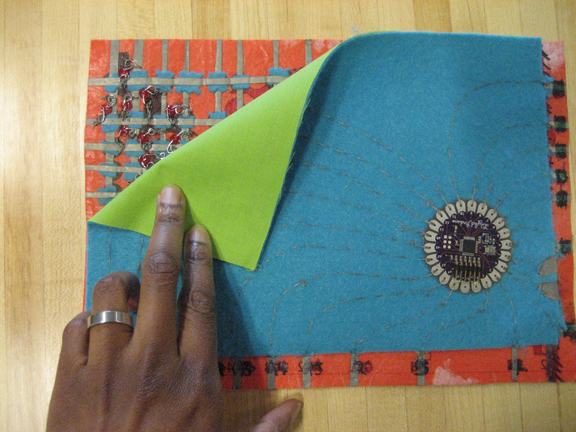Main.Team6HelloUSANeworkedWearable History
Hide minor edits - Show changes to markup
Charlie Plex State Drawing Detail
Charlie Plex State Drawing Detail \\

We did not have enough pins on our lilypad to control each led separately. Using charlieplexing we can have up to n*(n-1) leds, where n is the number of pins on our Lilypad. \\
We did not have enough pins on our lilypad to control each led separately. Using charlieplexing we can have up to n/2*(n/2) leds, where n is the number of pins on our Lilypad. \\
Programming
Lessons Learned
- After sewing leds use nailpolish to keep tiny frayed threads together and to prevent shorts.
Video\\
(:vimeo 10738583:) (:vimeo 10738582:) (:vimeo 10738578:)
\\
\\
\\
The horizontal pins were set to LOW and the vertical pins set to HIGH. Each state had an associated led, to turn on a particular pin its horzontal bar was called at LOW and its vertical bar was called at HIGH.\\
The horizontal pins were set to HIGH and the vertical pins set to LOW. Each state had an associated led, to turn on a particular pin its horzontal bar was called at HIGH and its vertical bar was called at LOW.
\\
We did not have enough pins on our lilypad to control each led separately. Using charlieplexing we can have up to n*(n-1) leds, where n is the number of pins on our Lilypad. A grid of conductive fabric was made, positive legs of the leds were sewn to horizontal bars, the ground leg was sewn to the vertical strips.
We did not have enough pins on our lilypad to control each led separately. Using charlieplexing we can have up to n*(n-1) leds, where n is the number of pins on our Lilypad.
A grid of conductive fabric was made, positive legs of the leds were sewn to horizontal bars, the ground leg was sewn to the vertical strips.
The horizontal pins were set to LOW and the vertical pins set to HIGH. Each state had an associated led, to turn on a particular pin its horzontal bar was called at LOW and its vertical bar was called at HIGH.
The horizontal pins were set to LOW and the vertical pins set to HIGH. Each state had an associated led, to turn on a particular pin its horzontal bar was called at LOW and its vertical bar was called at HIGH.\\
These Horizontal pins 11, 12, 13, a0(14), a1(15), a2(16), a3(17), a4(18), a5(19), 2, 3 were set to LOW. These Vertical pins 10, 9, 8, 7, 6, 5, 4 were set to HIGH.\\
These Vertical pins 11, 12, 13, a0(14), a1(15), a2(16), a3(17), a4(18), a5(19), 2, 3 were set to LOW. These Horizontal pins 10, 9, 8, 7, 6, 5, 4 were set to HIGH.\\
Here is a picture of the lilypad layer set over the charlieplex felt layer. This is the final layer that has the conductive thread connecting from the lilypad to the charlieplex grid as the edges of the felt.\\
Here is a picture of the lilypad layer set over the charlieplex felt layer. This is the final layer that has the conductive thread connecting from the lilypad to the charlieplex grid at the edges of the felt.\\
Here is a picture of the lilypad layer set over the charlieplex felt layer. This is the final layer that has the conductive thread connecting from the lilypad to the charlieplex grid.\\
Here is a picture of the lilypad layer set over the charlieplex felt layer. This is the final layer that has the conductive thread connecting from the lilypad to the charlieplex grid as the edges of the felt.\\
We did not have enough pins on our lilypad to control each led separately. So we used charlieplexing as a way to do this. A grid of conductive fabric was made, positive legs of the leds were sewn to horizontal bars, the ground leg was sewn to the vertical strips. \\
We did not have enough pins on our lilypad to control each led separately. Using charlieplexing we can have up to n*(n-1) leds, where n is the number of pins on our Lilypad. A grid of conductive fabric was made, positive legs of the leds were sewn to horizontal bars, the ground leg was sewn to the vertical strips. \\
This drawing shows the coordinate system that we used to light the leds.\\
This drawing shows the coordinate system that we used to light the leds from the Lilypad.
\\
These Vertical pins 10, 9, 8, 7, 6, 5 were set to HIGH.\\
These Vertical pins 10, 9, 8, 7, 6, 5, 4 were set to HIGH.\\
This drawing shows the coordinate system that we used to light the leds. \\
This drawing shows the coordinate system that we used to light the leds.\\
This drawing shows the coordinate system that we used to light the leds.
This drawing shows the coordinate system that we used to light the leds. \\
These Vertical pins 10, 9, 8, 7, 6, 5, 5were set to HIGH.\\
These Vertical pins 10, 9, 8, 7, 6, 5 were set to HIGH.\\
This drawing shows the coordinate system that we used to light the leds.
These Horizontal pins 11, 12, 13, a0(14), a1(15), a2(16), a3(17), a4(18), a5(19), 2, 3 were set to LOW.
These Vertical pins 10, 9, 8, 7, 6, 5, 5were set to HIGH.
So the horizontal pins were set to LOW and the vertical pins set to HIGH. Each state had an associated led, to turn on a particular pin its horzontal bar was called at LOW and its vertical bar was called at HIGH.
The horizontal pins were set to LOW and the vertical pins set to HIGH. Each state had an associated led, to turn on a particular pin its horzontal bar was called at LOW and its vertical bar was called at HIGH.
Here is a good reference for a fuller explantion of the Charlieplexing. http://en.wikipedia.org/wiki/Charlieplexing\\
We could then program the power to be sent to each led, and turn all the others off by making them the opposite charge of the led we wanted to light up.
We could then program the power to be sent to each led, and turn all the others off by making them the opposite charge of the led we wanted to light up.
So the horizontal pins were set to LOW and the vertical pins set to HIGH. Each state had an associated led, to turn on a particular pin its horzontal bar was called at LOW and its vertical bar was called at HIGH.
\\








- After sewing leds use nailpolish to keep tiny frayed threads together and to prevent shorts.










 Here is a picture of the lilypad layer set over the charlieplex felt layer. This is the final layer that has the conductive thread connecting from the lilypad to the charlieplex grid.\\
Here is a picture of the lilypad layer set over the charlieplex felt layer. This is the final layer that has the conductive thread connecting from the lilypad to the charlieplex grid.\\
We did not have enough pins on our lilypad to control each led separately. So we used charlieplexing as a way to do this. A grid of conductive fabric was made, positive legs of the leds were sewn to horizontal bars, the ground leg was sewn to the vertical strips.
We did not have enough pins on our lilypad to control each led separately. So we used charlieplexing as a way to do this. A grid of conductive fabric was made, positive legs of the leds were sewn to horizontal bars, the ground leg was sewn to the vertical strips.
Here is a picture of the back of the map. The leds are sewn positive leg to horizontal and ground to vertical.
Felt pads are used to keep horizontal and vertical layers apart.\\
We did not have enough pins on our lilypad to control each led separately. So we used charlieplexing as a way to do this. A grid of conductive fabric was made, positive legs of the leds were sewn to horizontal bars, the ground leg was sewn to the vertical strips.
We could then program the power to be sent to each led, and turn all the others off by making them the opposite charge of the led we wanted to light up.
Circuit Drawings\\
Circuit Drawings\\
Charlie Plex State Drawing Detail
Charlie Plex State Drawing Detail
CharliePlexing \\
CharliePlexing \\
Programming
Lessons Learned\\
Programming
Lessons Learned\\


Attach:

Charlie Plex State Drawing Detail Attach:
Circuit Drawings

Programming
Programming
Lessons Learned\\
Call Us
Call Us
Video
CharliePlexing
Programming
Hello U.S.A.!!
Call Us!
Hello U.S.A.!!
Call Us